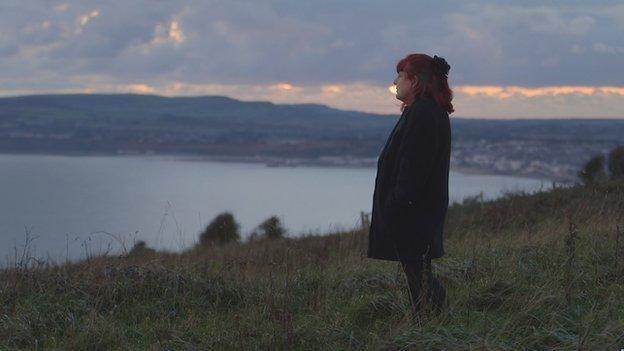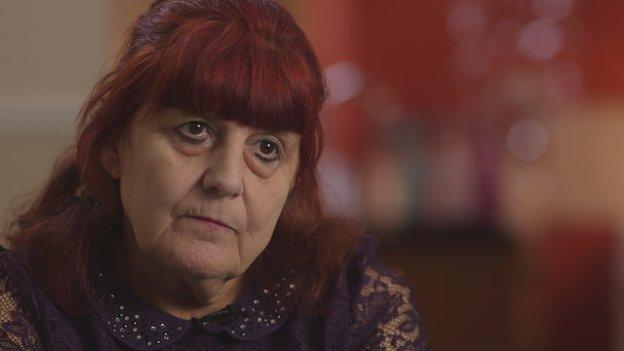Could legislation halt non-physical domestic abuse?
- Published

Dawn returns to an isolated spot where she was abused
Home Secretary Theresa May could soon announce a new offence in England and Wales to tackle domestic abuse. The law will cover coercive and controlling behaviour within a relationship, as legislation already exists to tackle violence. But why is it needed?
"Why didn't you leave?"
It's a question I've heard asked many times of victims of domestic abuse.
Each time I hear it, it jars.
That's because - irrespective of whether the abuser is male or female - it presumes the victim has a choice, and secondly, it puts the onus on the individual to get out, when surely it's the perpetrator who should be quitting the family home?
Some people can't leave a violent or controlling partner because they're petrified.
It's often the reason they won't give a statement to help the police prosecute - because the beating to come after such a "betrayal" might be the one that finishes them off.
Sometimes the abuser has threatened to harm or kill them if they dare call 999.
'House rules'
The same threat hangs over them if they don't abide by twisted "house rules", which can include not seeing friends; not having access to the phone, the car, or money; having to cook certain meals or prepare food in a particular way; or wearing clothes approved by the partner.
Any deviation from those "rules" and the partner knows what's to come - potentially being hit, punched, spat upon, attacked or screamed at.
Sometimes it's simply the threat of such violence towards them or the children that can oppress an individual and convince them they have no choice but to do what is demanded of them.
Such manipulation is known as coercive control.
It's usually, but not always, non-violent.
The home secretary is considering bringing in a new law that makes controlling and coercive behaviour in intimate relationships a criminal offence, punishable with jail.
The government says controlling behaviour can include isolating a person from friends or family and depriving them of money, for example, to make them feel subordinate or dependent.
Coercive behaviour can include "assaults, threats, humiliation, intimidation all used to harm or punish or frighten an individual".
Criminologist Dr Jane Monckton Smith says: "Most of the behaviours that make up coercive control are not on their own, or even together, [currently] against the law.
"If we start recognising the control, we might be able to start preventing future deaths."
Dr Smith adds: "When somebody is controlled, that's exactly what it is - those choices are taken away.
"She can't leave. She might get killed."

Case study

Dawn says the footage filmed by police gave her strength
Dawn, 60, lives on the Isle of Wight.
Her partner of 10 years, Michael, regularly used to hit her as well as control her life.
She had to ask his permission to go to the toilet, could not answer the phone after 21:00 and was isolated from her grown-up children.
On the night of Michael's 76th birthday he launched a violent attack on her.
The devastating injuries to her face and ribs were captured on the body cameras worn by the two police officers who came to investigate.
The skin around Dawn's eyes was black from acute bruising; she was barely able to open them because of the damage to her sockets.
Her face was badly swollen. She was hunched because of the ribs her partner had cracked as he knelt on her chest.
Yet the scene is chillingly calm - there's no rage or panic or screaming.
The footage reveals the total subjugation of Dawn by her husband even in front of the officers.
Dawn told Panorama: "My mind wasn't my own any more. I was frightened - I was frightened of the police, I was frightened of him, I was frightened of everything".
"He didn't seem to even think he was doing anything wrong," she explains. "In his mind all he was doing was cooking me a meal."
As they arrest him, Michael demands Dawn pack him an overnight bag - which she does, quietly and purposefully.
"You got me arrested again didn't you?" he says threateningly.

Disservice
There are still questions for the police, or the Crown Prosecution Service, about how you recognise and prosecute coercive or controlling behaviour.
The backdrop to Mrs May's consultation was a report from Her Majesty's Inspectorate of Constabulary earlier this year that showed some police forces in England and Wales were failing victims of domestic abuse.
The home secretary effectively wanted to know if having new, "strengthened" legislation, would better protect victims by helping the authorities recognise that psychological, non-violent abuse is a serious crime.
There are arguments against it:
Does it duplicate existing legislation?
How would it be policed?
Does it divert or distract officers from protecting individuals from actual violence?
Erin Pizzey, who founded the first women's refuge in west London in the early 1970s, believes such a law would do a disservice to "women in genuine domestic violence situations", adding that "domineering husbands who shout at their wives but who never lift a finger to hurt them would find themselves in court".

Domestic abuse
One in 10 prosecutions now involves domestic violence
100,000 people in England are believed to be at high risk of serious harm or murder from domestic abuse
Nearly 80 women last year were killed by their partner or ex-partner
Sources: Office for National Statistics England and Wales, Co-ordinated Action Against Domestic Abuse England and Wales

The Home Office is due to make an announcement soon on how it's going to proceed.
Michael has since been jailed for 10 years.
Dawn says she is trying to rebuild her life: "The damage doesn't go away... well, I don't think it will ever go away. They say time heals but sometimes it doesn't."
Watch Panorama: Domestic Abuse: Caught on Camera on BBC One on Monday at 20:30 GMT.